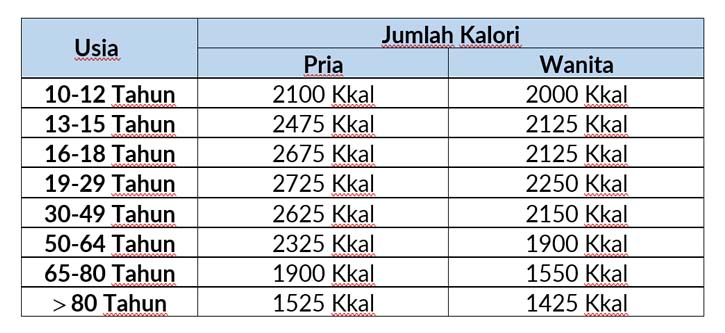
The nutritional and calorie needs of each individual will be different, this is due to several factors, including: gender, age, body size (weight and height), physical activity and health condition of the body.
Gender is one factor that differentiates individual nutritional and caloric needs. This is due to the different body composition of men and women. Men have more muscle mass, while women have more fat mass. The metabolism of a body with greater muscle mass requires higher calories, compared to a body with smaller muscle mass.
The average daily calorie requirement for adult men ranges from 1500 - 2725 calories per day, while women need around 1400 -2250 calories per day. Caloric needs can also differ based on age range, as presented in the following table:

Unlike men, women experience several periods in their life cycle that affect metabolism and nutritional needs, including; menstruation, pregnancy, lactation and menopause. This situation will affect the composition and metabolism of the body, so that nutritional needs must also be adjusted . Nutritional needs include macronutrients (carbohydrates, protein and fat) and micronutrients (vitamins and minerals).
The following are some examples of macronutrient and micronutrient nutritional needs that are needed in different amounts between men and women, namely:
- Proteins
Adult men and women have a protein requirement of 15-25% of the total daily calorie intake. However, there is a difference where men tend to have higher activity than women, so men tend to need more protein than women. Another condition that needs attention is pregnant and lactating women who require a higher protein intake than adult women in general.
Protein consists of animal and vegetable protein. Animal protein is obtained from beef, goat, chicken, fish and eggs, while vegetable protein is obtained from nuts and cereals. Pregnant and lactating women are encouraged to consume more animal protein than vegetable protein.
- Calcium
Calcium is an important mineral for good bone health. Women tend to be more at risk of decreased bone density ( osteoporosis ) than men because they experience a period of pregnancy and breastfeeding which has a very high calcium requirement. It is highly recommended for pregnant and lactating women to consume calcium-rich foodstuffs and to consume calcium supplements if needed. With women's physical activity levels which tend to be lighter than men's, the bone compaction process is not optimal.
The nutritional adequacy of calcium for each person is 1000 mg per day, but under certain conditions supplementation can be added with a safe dose of 1200-1300 mg. Consuming excessive amounts of calcium supplementation is not recommended, because it can increase the risk of heart disease, kidney stones and can cause stomach discomfort. The absorption of calcium in the body needs to be assisted by vitamin D nutrition, so it is also recommended to meet the needs of vitamin D to optimize calcium absorption.
- Iron.
As with calcium nutrition, iron is also needed by women in higher amounts than men, especially during menstruation, pregnancy and the postpartum period. Mothers with iron deficiency can give birth who tend to have iron deficiency conditions as well. Therefore, it is very important for women to consume iron-rich foods from their teenage years. The iron requirement for adult women is 18 mg, while for adult men it is only 9 mg. In helping the absorption of iron, adequate intake of vitamin C is also needed. In certain medical conditions, supplementation can be given to meet their needs.
Nutritional needs, both macronutrients and micronutrients, vary greatly for each individual, as well as calorie needs. To find out more about the nutritional and calorie needs of the body, you can consult with a Clinical Nutrition Specialist who practices at the nearest EMC Hospital.
Article written by dr. Aditya Mulyantari, Sp.GK, M.Nutrition (Clinical Nutrition Specialist at EMC Sentul Hospital).
